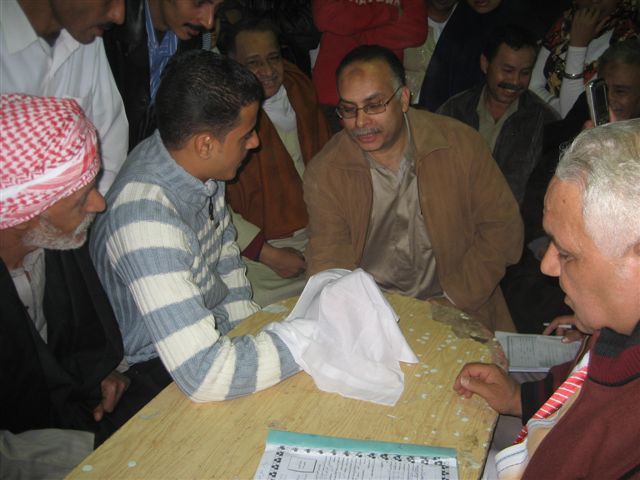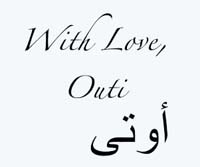

Groom and the father of the bride are pledging marriage vows. El ma'zun on the front with the marriage papers.
Greetings from Cairo part XII
Published in Ishtar 2/2009
Getting Married in Egypt
translated by Anu Toivonen
The survival of the human race is dependent on two people joining together to produce offspring. The cultural framework associated with this varies from one culture to another.
The Egyptians believe in marriage and a large part of the upbringing of both boys and girls includes the idea of a future wedlock. Even small children are presented with potential future spouses, albeit half jokingly, but behind this lies harsh reality. Girls dream of being married and they want to care for their children at home ‘when they grow up’.
The society is slowly changing but many old customs are still followed. University studies widen the young people’s circle of friends and young adults find a new network of acquaintances at their working place. Even though children of tolerant families may be able to affect the choice of the future spouse in many families, particularly in the countryside and Southern Egypt, the parents wield unlimited power.
Muslims and Christians
In this article, I’m mainly discussing the situation and customs of a Muslim family. The Coptic Christians have an own set of customs. While cross-religious marriages are not popular a Christian woman may sometimes marry a Muslim man, which may result in her family’s casting her off. As Egypt is an Islamic country and religion is considered to follow the male line, a Christian man may not marry a Muslim woman in Egypt. In such a case, the couple must travel abroad to get married and they often remain there.
Mirror, mirror on the wall,
who’s the best groom of them all
The western world finds marriages between cousins largely unnatural and to avoid genetic illnesses, it would be sensible to marry new blood into the family as after a few generations, the offspring of repeated marriages between cousins may begin to carry several severe genetic conditions. In the Muslim world, however, these marriages have several good points in their favour the strongest being the undivided family fortune.
According to the Quran, a woman is entitled to her share of the inheritance after her parents. When a girl is married off to another family her portion of the family fortune is lost. In a way, a person is lost to another family and the father and brothers have absolutely no authority over her, the sole authority being the new husband. The father and brothers may still be able to influence the bride’s position: if the husband feels they are strong and still care for the newly wedded wife her wishes will be respected more.
If the girl marries within her own extended family and her new home is nearby, her position is more secure. The husband will probably treat his wife better and respect her opinions because she is part of his own family anyway. If she lives near her own family, she is able to seek for safety in her childhood home in case of a conflict. Any problems arising in marriages within the family can be held within.
The whole family looking for a spouse
When looking for a spouse, all the family members are in an important position. Mothers with sons in marriageable age are looking for potential brides and, most importantly, controlling their acceptability the criteria being her family’s respectability, her own industriousness and her manners. Young maids ask about their friends’ brothers their family’s respectability, their financial situation and religiousness being important factors.
For a widowed person, a new spouse must be soon found as a woman needs economic security and a man needs someone to look after the home and children. The community may include a professional marriage broker who will seek for a suitable spouse for a fee. They will know who is in need of a spouse at any given moment; whose wife just died, which sister is becoming nubile, who has the means to support a family.
A young girl entering her first marriage is valuable and her dowry and other articles of the marriage contract are carefully considered. Everything is done with great deliberation and the parents want to arrange a good contract to secure her future. Marrying off a widow or a divorcee is not so carefully planned; the groom has smaller financial obligations, there will be no great wedding celebration and not even the car horns are sounded so enthusiastically. However, this time the woman’s own opinion counts more, as she is already a grown woman and probably also a mother.
Being engaged
The engagement party, khutooba, may be a grand occasion and often celebrated like a wedding. The bride is decorated with sequins and beads and only the bright colour of her dress will separate it from a wedding dress. The finances permitting, the engagement party can be as sumptuous as a wedding with a decorated hotel reception, orchestra, banquet and even dancers and famous singers. The engagement parties of the wealthy are presented on the society pages like weddings.
At the engagement party, the bride receives a golden ring and a Muslim groom gets a silver one. Some families publicly present the shabka, the golden jewellery provided by the groom, at the party but this jewellery may also be bought later in which case it is presented at the wedding. This Marriage Gold, the dowry, represents the wife’s economic security, which she may sell, if she so wishes, to help in the family’s financial difficulties. In a divorce, the gold will financially help the wife.
According to the present law, a woman seeking a divorce without an acceptable reason (physical abuse, drug use, alcohol abuse, inability to financially support the family or misuse of finances) will lose her right to her Marriage Gold as well as to all the other possessions she brought into the marriage.
Engagement gifts and trousseau
During the engagement, the young couple may learn to know each other. They are able to meet, talk and go for a walk together. The groom will often visit the bride’s home bringing gifts fruit, perfume as well as watches and other accessories being very common. Sometimes he may bring valuable objects, even golden jewellery. If the bride, for some reason, decides to break off the engagement these gifts are returned or the bride’s family pays back the gifts’ full value. If the groom wishes to do the same, he may have back some or all of the gifts, but this does not always happen.
At some point, before the contract and wedding – sometimes even before the engagement party – a male representative of the bride, the groom and a number of close family members will meet to decide the financial issues. The contract will state the worth of the Marriage Gold and the monetary compensation in case of a divorce occurring on his initiative. The furniture, other objects and household appliances provided by each family are listed separately for the bedroom, living room, kitchen and dining room. The bride will often be responsible for acquiring her own clothes as well as the kitchen utensils. As the wedding draws nearer, the bride’s shopping mania is fierce; at first she will go shopping once a week, which will increase to a daily spree as the wedding approaches.
The girls and their mothers start to assemble the trousseau when the girls are still very young as the linen and the china can be bought well in advance whereas shampoos and make-up are not too insignificant articles during the last minute preparations.
The drawback to breaking off an engagement
It is quite common to break off an engagement, but there is a downside to it. If both families are respectable and no other obvious faults can be found, especially a young girl may get a reputation of being difficult and proud. This happens very easily if her clothing and behaviour give the slightest reason to doubt her morals and decency. Especially in the country, where the rumours spread and gossiping about you neighbours is an important pastime, a small molehill will soon turn into a mountain.
Writing the Book – katb el kitab
Signing a marriage contract makes the marriage legal. The bride and groom, along with their families, gather to celebrate this in a mosque or the house of one of the families. The groom or a male representative of his family and the bride’s male representative – often her father – sit in front of el ma’zun who usually is the local sheikh, the learned man. El Ma’zun will hear the agreement of both parties to the intended marriage and if the bride is not present, a representative is sent to her home to ensure her willingness. In addition to personal identification, the contract will include a passport photo of both parties as many people may have the same name. After the signature, a thumbprint is also pressed on the contract. If the bride is not present she may sign and provide her thumbprint later.
After the written documentation the groom and the bride’s representative shake hands, a cloth is spread over their joined hands and el ma’zun asks for both parties’ agreement to this marriage. The marriage contract is only given to the married couple a few days or even a week later.
The celebration
The wedding party, doghla, is held after the official part is over and it will announce as well as make evident the change in the marital status for the whole community. After the party, the young couple may move into their new home together. The contract is often signed in the morning, the bride spends her day getting beautiful at the hairdresser’s salon and the wedding party will go on late into the night. Sometimes the actual contract may be singed years before the celebration, but moving together is only possible after the party.
The Henna night always takes place the night before the wedding party.
Secret union of Orfi
Orfi unions are mutual and secret marriage agreements between two parties who then will have absolutely no obligations or rights. An Orfi union is easy to dissolve by only destroying the paper the agreement is written on, as this kind of marriage is not registered with the state or the church. Usually there is only one copy, most often kept by the man, so the wife may not even have a copy of her own. An Orfi union may also have a deadline, after which it is automatically dissolved.
There are different reasons for Orfi unions. Sometimes the reason is financial: if the groom or his family cannot afford the Marriage Gold, the apartment and part of the furniture, an Orfi union may initially be agreed upon. The couple may then later enter into a proper marriage with all its financial obligations.
A more common reason is to be able to have marital relations – sex – and as dating and cohabitation are inappropriate in a Muslim society, an Orfi union provides a way to circumvent this rule.
To please the men
The parties in an Orfi union may be young people in their late teens or early twenties. For young upper class women used to westernised customs and Orfi union is a way to be with the young man of their choice. However, an Orfi union is usually initially suggested by the man. Young women fall in love with their fellow students and a young man may suggest an Orfi union with beautiful promises of a future marriage when in fact he does not want to marry a girl who will agree to this kind of a union.
Instead of taking a mistress, a married man may enter into an Orfi union. Rich Arab men may enter into an Orfi with a couple of months’ deadline when coming to party in Cairo during the summer season or they may support another family in another country.
Orfi provides no security for the woman
In a relatively weak Orfi union the contract is signed only by the contracting parties without any witnesses, whereas the presence of witnesses will provide a measure of security. In the event of any after effects – the woman becoming pregnant – the man may deny paternity and, indeed, the whole union. In the absence of witnesses there is nobody to prove the marriage ever existed.
n Orfi union leaves the woman in a very vulnerable position, as nobody is aware of the marriage. Afterwards, it is very difficult to explain the lack of virginity when entering into a proper marriage. Consequently, the hymen repair operations have become more common. As is so often the case also in the western societies, a woman’s reputation is fragile, whereas a man loses nothing in an Orfi union: he cannot become pregnant, he has no obligations and a reputation of an experienced womaniser only adds to his lustre.
Easier?
The Egyptians consider the western marriage system easier: the man need not pay as much, many people already have an own home and the family adds no pressure. When answering this I have always pointed out that, at least in Finland, it is much more difficult and expensive to get a divorce. Dividing the finances in half or according to a pre-nuptial agreement, state regulated six-month reconsideration period and the monthly child support, for their part, encourage one to carefully reconsider the idea of marriage.

|
